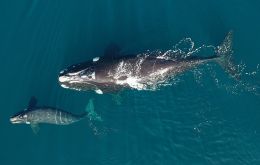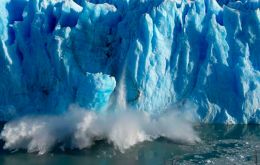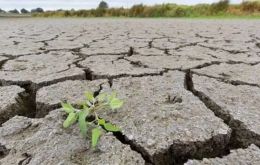MercoPress. South Atlantic News Agency
Tag: Climate change
-
Friday, November 11th 2022 - 10:20 UTC
Falklands residents demand “local and world leaders tackle climate change”

In the light and spirit of COP27 a group of Falklands residents have organized a demonstration to “demand action from leaders, both locally and worldwide to tackle the natural disasters we currently face,” organizer Mark McLeod told Penguin News. The demonstration will take place at the Jetty Centre at midday on Saturday November 12.
-
Friday, November 11th 2022 - 10:07 UTC
New satellite monitoring of whales in South Atlantic underway

The 7th edition of the whale satellite monitoring program by the Argentine branch of the Wildlife Conservation Society started the monitoring of 22 specimens in the Atlantic Ocean to obtain data on the life cycle of the southern right whale species, it was reported.
-
Tuesday, November 8th 2022 - 08:52 UTC
British Antarctic Survey participating at the UN COP27 convention in Egypt

British Antarctic Survey (BAS) scientists will participate in the 27th session of the United Nations National Framework Convention on Climate Change, hosted by the Arab Republic of Egypt until 18 November 2022 at the Sharm el-Sheikh International Convention Centre.
-
Thursday, November 3rd 2022 - 20:40 UTC
One-third of the world's glaciers will be soon gone, UNESCO warns

A UNESCO study released Thursday has shown that one-third of the glaciers worldwide are bound to disappear due to global warming.
-
Thursday, November 3rd 2022 - 10:23 UTC
WMO warns temperatures in Europe rising twice as fast

Temperatures in Europe have gone up at a pace of about 0.5 °C per decade between 1991 and 2021, according to the United Nations' World Meteorological Organization (WMO) and the European climate change service Copernicus.
-
Wednesday, November 2nd 2022 - 20:15 UTC
Increase in dengue cases in Brazil poses threat to Argentina

A leading Argentine scientist believes that the increase in the number of cases of dengue reported in neighboring Brazil requires action from local health authorities amid threats of local outbreaks.
-
Wednesday, November 2nd 2022 - 20:13 UTC
PM Sunak now says he will attend COP27

British Prime Minister Rishi Sunak finally changed his mind once again and announced Wednesday that he will be attending the COP27 Climate Summit later this week in Egypt.
-
Saturday, October 29th 2022 - 10:20 UTC
Climate variability complicating crop sowing in Brazilian farming states

Climate variability and excessive rainfall have delayed the planting of Brazil’s 2022/2023 soy crop, which reached 34% of the estimated area, against 24% in the previous week and 38% in the same period last year, according to a survey by AgRural released this week.
-
Friday, October 28th 2022 - 10:30 UTC
Brazil will go back to being environmentally conscientious if Lula wins

Former Brazilian Environment Minister Marina Silva Thursday said during a press conference in Sao Paulo that “we need an environmentally sustainable, politically democratic and socially developed country.”
-
Friday, October 28th 2022 - 10:27 UTC
EU agrees carmakers must achieve 100% cut in CO2 emissions by 2035

The European Parliament and the European Commission agreed that carmakers must achieve a 100% cut in CO2 emissions by 2035. This means no new vans or cars with combustion engines, gasoline or diesel, are to be sold in the European Union from 2035.
